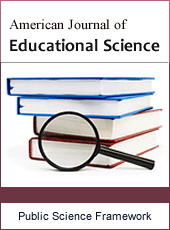American Journal of Educational Science
Articles Information
American Journal of Educational Science, Vol.1, No.4, Sep. 2015, Pub. Date: Aug. 10, 2015
Investigating the Relationship Between Learning Styles and Educational Achievement of the Elementary School Students
Pages: 199-203 Views: 5270 Downloads: 1623
[01]
Zahra Alizadeh, Department of Educational Sciences, Payame Noor University, Iran.
[02]
Farhad Heidari, Department of Educational Sciences, Gilan-E-Gharb Branch, Islamic Azad University, Gilan-E-Gharb, Iran.
The purpose of this study is to investigate the relationship between learning styles and educational achievement of the elementary school students in the city of Gilan-e-Gharb. The research is performed through descriptive method with a correlation design, which follows a functional purpose. The statistical population consists of all the elementary school students in Gilan-e-Gharb city in 2014, which 265 subjects were randomly selected as the statistical sample due to Krejcie's and Morgan's Table. Learning styles questionnaire of Kolb (1985) and the students' average of the previous semester (January, 2014) as a measure for assessing educational achievement is used to assess the students' learning styles. In this study, Cronbach's alpha coefficient for Kolb's learning styles test was estimated 0.890. Descriptive statistics and inferential statistics including Kolmogorov-Smirnov test, correlation and regression coefficients were performed using software SPSS 21 to analyze data. The findings showed that there is not a significant relationship between convergent learning style (r=-0.381 & p=0.651) and assimilating learning style (r=-0.412 & p= 0.780) with educational achievement. But, there is a significant relationship between divergent learning style (r=-0.329 & p= 0.000) and adapting learning style (r=-0.451 & p= 0.003) and educational achievement of the elementary school students in Gilan-e-Gharb city. The results of regression analysis revealed that 18 percent of learning styles can predict the variance of the students' educational achievement.
Learning Styles, Educational Achievement, Elementary School Students
[01]
Atash-Rooz, B., Pakdaman, Sh. & Asgari, A. 2008. The relationship between the five traits of personality and educational achievement, Iranian Psychological Journal, pp. 14-16.
[02]
Ashraf-Abadi, F& Karimi, B. 2013. The relationship between personality characteristics and educational performance of students of the Faculty of Humanities and Social Sciences, Razi University, MA thesis in General Psychology, University of Tabriz.
[03]
Izadi, S. & Mohammad-Zadeh, R. A. 2008. Relationship between learning styles, personality characteristics and educational performance. Monthly of Research-scientific of Shahed University, p. 27-.
[04]
Raeis Saadi, H. 2007. Investigating the relationship between achievement motivation, causal attributions and educational achievement in college students. M. A. Thesis at Faculty of Psychology and Educational Sciences, Allameh Tabatabai University.
[05]
Zaki, M. A. 2010. The young's compatibility with university and its relation to social protection. Case study; male and female students of Isfahan University, specielized monthly of "the young researches, culture & society, No. 4th, pp. 107-130.
[06]
Saif, A. A. 2007. New educational psychology. Tehran; Doran Publication.
[07]
Saif, A. A. 2011. Evaluation measurement, assessment and training. Fifth edition, Tehran; Doran Publication.
[08]
Sarchami, R. & Hosseini, S. M. 2004. The relationship between learning styles and educational achievement of nursing students of Qazvin. Journal of Qazvin University of Medical Sciences and Health Services, No. 30.
[09]
Sharifi, N., Ganji, H. & Najafi Zand, J. 2011. A comparison of cognitive intelligence, creativity and emotional intelligence in predicting educational achievement of students at different levels of education. Journal of the newest in industrial / organizational psychology, year 2nd, No. 6th, pp. 17-29.Kadivar, P., Farzad, V., Kavosiyan, J. & Nikdel, F. 2009. Validating educational emotions questionnaires. Journal of Educational Innovations, No. 8 (32), pp. 7-30.
[10]
Mohamadzadeh Admlayy, Rajab Ali. (1384). Comparison of Shahid Chamran University students chanting of the different learning styles of personality, achievement motivation and educational performance. MA thesis in Educational Psychology, Faculty of Education and Psychology, Shahid Chamran University.
[11]
Altun, F. & Yazici, H.(2010). Learning styles of the gifted students in Turkey. Procedia Social and Behavioral Sciences, Vol 9, p 198-202.
[12]
Ismail, A., Hussain, R. M. R., & Jamaluddin, S.(2010). Of students learning styles preferences in the faculty of science, Tishreen University. Syria, Procedia Social and Behavioral Sciences, 2, 4087-4091.
[13]
Kolb, D.(1985). Learning style inventory, Technical manual, Boston, MA: Mcber and Company Press.
[14]
Komarraju. M., Karau. S. J, Ronald, R., & Schmeck, Alen.(2011). The Big Five personality traits, learning styles, and educational achievement. Journal of Personality and Individual Differences, 12, 472-477.
[15]
Laidra, K., Pullmann, H., & Allik, J. R.(2008). Personality and intelligence as predictors of educational achievement: A cross - sectional study from elementary to secondary school. Personality and Individual Differences, 42, 441–451

ISSN Print: 2381-7127
ISSN Online: 2381-7135
Current Issue:
Vol. 6, Issue 2, June Submit a Manuscript Join Editorial Board Join Reviewer Team
ISSN Online: 2381-7135
Current Issue:
Vol. 6, Issue 2, June Submit a Manuscript Join Editorial Board Join Reviewer Team
| About This Journal |
| All Issues |
| Open Access |
| Indexing |
| Payment Information |
| Author Guidelines |
| Review Process |
| Publication Ethics |
| Editorial Board |
| Peer Reviewers |


